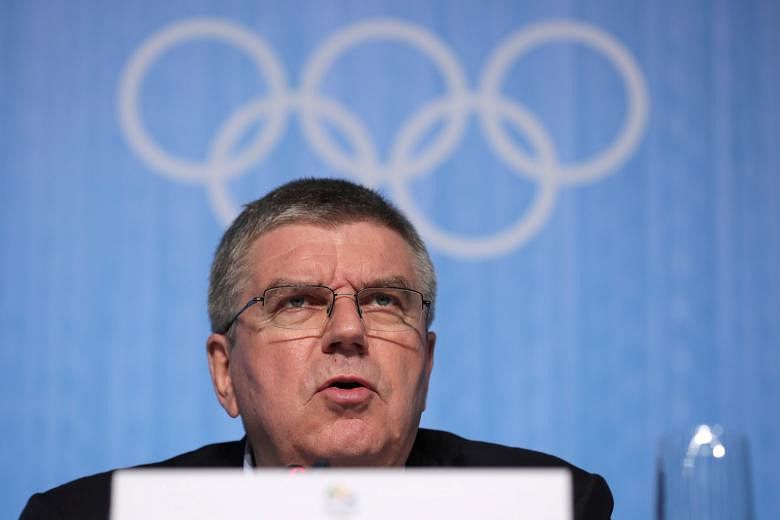RIO DE JANEIRO • Thomas Bach has rejected claims that he was personally influenced by Russia, after the International Olympic Committee (IOC) faced strong criticism over the decision to let Russian athletes compete at the Rio Games.
The IOC president said on Sunday that he had no contact with the Russian government after this month's publication of an explosive report which revealed a wide-ranging, state-sponsored doping regime.
The McLaren report prompted calls for the IOC to ban Russia from Rio, but the Olympic body instead opted to leave it up to individual sports federations to either allow or bar Russian athletes.
The decision was widely criticised, with speed skating great Claudia Pechstein accusing Bach, a fellow German, of being "bought politically".
Britain's former Olympic swimmer Sharron Davies said the IOC chief was too "buddy buddy" with Russian President Vladimir Putin.
But Bach firmly said "No" when asked whether he had any contact with Russian officials between the McLaren report's publication and the IOC decision nearly a week later.
"I haven't been talking to any Russian government official since the publication of the McLaren report and not even in the time, the days or weeks preceding," he told journalists at Rio's Olympic Park.
The IOC decision has left Russian athletes in flux, with the final composition of the Russian team still unknown three days before the Games.
But Bach said he did not think that the incident would turn out to be damaging for the Rio Games.
"I don't think that this event will be damaging because people will realise that we have to take this decision," he said.
"Imagine the situation if we (had not) taken a decision, what then the limbo would be. And imagine the situation if we would have taken another decision, what ridicule and legal limbo this would be. I trust the people, that they realise the difficulties we are in.
"They realise that it was not an easy decision to take and they realise that we did our best to address this situation in a way which allows (the IOC) to protect all clean athletes all over the world."
There have also been recriminations over who is to blame for the huge doping controversy revealed in a German television documentary in 2014 and now casting a shadow over the Rio Games.
Bach rejected suggestions that the chaos represented a "huge failure" for the IOC.
"The IOC is not responsible for the timing of the McLaren report," he said in a veiled attack on Wada. "The IOC is not responsible for the fact that different information which was offered to Wada already a couple of years ago was not followed up."
Russian anti-doping agency whistle-blower Vitaly Stepanov says he first began passing information to Wada in 2010.
Meanwhile, the Court of Arbitration for Sport (CAS) raced yesterday to decide appeals by Russian athletes against their ban.
Swimmer Yulia Efimova and wrestler Viktor Lebedev registered appeals at the CAS, taking the total number of Russian challenges to four, with more still possible.
At least 117 of the 387 competitors Russia had wanted to send to Rio have been excluded.
Russian Sports Minister Vitaly Mutko said the final decision on the number of Russian athletes allowed to compete could be reached by today.
"I hope that today or tomorrow all the formalities regarding letting the team (compete in Rio) will be completed," he told RIA Novosti news agency in Paris yesterday.
AGENCE FRANCE-PRESSE, REUTERS

